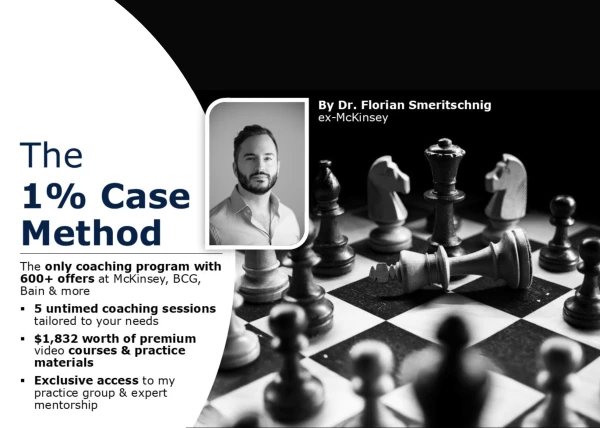Would it be worthwhile learning Excel for data analysis and PowerPoint for story telling? Are there any Business Modelling Course and Financial Modelling Course specific to excel you could suggest please? Are there any skills and/or courses you would recommend which might be beneficial please?
Acquire Skills over the summer in preparation for starting work - consulting entry level.


Hey there,
Congrats on the achievement!
If you are interested in preparing for your new role, I'd suggest the following:
When I got the offer some years ago I did the same. I reached out to people I knew in McKinsey and people who interviewed me to ask: what can I do to make the start easier? how can I prepare?
The answer from everyone was: Relax! Enjoy your time before you start and don't think about it. You will figure it out on the job. I followed that advice and it made sense to me once I joined.
When you start at in top tier consulting there are 2 ways to learn:
- Formal training. The formal training sessions/ weeks/ days in the beginning, are nice, however, they are more for networking and meeting your peers. You learn some interesting concepts and get some useful tips from more experienced consultants BUT
- Constant and implicit learning on the job is where it's at. No matter if you are a newcomer or a veteran after 2 years, you will always find yourself on a steep learning curve. As soon as you barely mastered one skill or the skills needed for one level in the hierarchy, you will take care of things, which are expected from a more senior colleague. This cycle never ends. You are expected to learn on the job, learn from your colleagues, your mentors, and sometimes even the client. So basically a newly promoted Engagement Manager has the same 'struggle' as a new-hire Business Analyst. They both need to work in a completely new environment and role.
Knowing that, if we now go back to square one in your Bain journey it makes perfect sense to enter the firm with a blank slate with a lot of curiosity and eagerness to soak it all up and quickly learn the ropes.
Nothing matches the experience and the learning and this is a good thing (also the reason why ex-MBBs are valued highly on the job market).
You will learn everything you need to master while doing it. You will be thrown in the cold water and need to swim. However, your colleagues will always be happy to help you and mentor you. And for the rest, you will figure everything out along the way. The key here is always to ask for tips, shortcuts, feedback, etc. Don't be quiet if you get stuck.
Lastly, if you have no domain knowledge about a certain industry or topic, read through the internal library of documentation (which is endless) and call some of the firm experts on the topic. Usually, they are happy to offer you a short call to get you up to speed.
But here’s something extra: Since the question came up ever so often with my clients, I've authored a book which you can find on Amazon specifically to guide newcomers like you in navigating this journey. The goal of the book was to answer all typical questions of entry-level consultants and show them the way to make the entry and the transition as simple and painless as possible.
While no book or training can entirely prep you for the unique experiences of your first day, week, or project, it offers comprehensive insights to mentally prepare you, suggests essential tools and skills to acquire, shows you the ways how to do that, and strategies to quickly adapt and excel in your new role.
I have also created a video for PrepLounge on how to manage your work-life balance based on an excerpt from the book: https://youtu.be/4VK8wL_xsmQ?si=giSBhp2EaP8XiS3B
You can DM me if you want to know more.
In any case, don't sweat the small stuff, and enjoy the ride!
Florian

hey there!
Yes, Excel and PowerPoint are essential tools for any consulting role, especially at entry level, where you'll likely be handling a lot of data analysis and crafting presentations. Getting a head start in both will definitely give you an edge.
Here’s a more detailed breakdown from my point of view & experience:
1. Excel for Data Analysis
- Why it’s important: You’ll often work with large datasets, perform analyses, and create financial models or forecasts. Being proficient in pivot tables, VLOOKUP, IF statements, data visualization (charts, graphs), and macros will make you much more efficient.
- Courses:
- Excel for Business on Coursera (by the University of Macquarie) – covers basic to advanced Excel techniques.
- Excel Skills for Business Specialization by Macquarie University on Coursera – comprehensive and tailored for business analysis.
- LinkedIn Learning: Excel for Financial Analysts, Excel for Data Analysis — a great mix of business-focused Excel courses.
2. PowerPoint for Storytelling
- Why it’s important: In consulting, the ability to create clear, compelling presentations is a must. You’ll be expected to communicate your findings effectively to clients, so a strong PowerPoint skill set can help you design impactful slides and tell a persuasive story.
- Courses:
- "PowerPoint for Business: Mastering PowerPoint" on LinkedIn Learning – a comprehensive guide to creating impactful presentations.
- "Presentations that Persuade" by Kenny Nguyen (available on Coursera/LinkedIn) – focuses on telling a story and making presentations more engaging.
3. Business and Financial Modeling
- Why it’s important: Many consulting projects require financial models (budgeting, forecasting, and valuation) or business models (e.g., pricing strategy, market analysis). Strong Excel modeling skills will help you hit the ground running.
- Courses:
- Financial Modeling & Valuation Analyst (FMVA) by CFI – Excellent for financial modeling skills, specifically for Excel-based work.
- Financial Modeling for Beginners in Excel on Udemy – Great for beginners and focuses on practical, real-world Excel financial models.
- Business Model Canvas course by Strategyzer – While not Excel-specific, it focuses on strategic modeling of business ideas.
- Corporate Finance Institute (CFI) also offers various specific courses like Modeling & Valuation, Excel Crash Courses, etc., which are highly practical.
4. Other Useful Skills
- Data Visualization: Understanding tools like Tableau or Power BI can help if you need to visualize complex data sets for clients.
- Power BI: LinkedIn Learning and Udemy have excellent beginner to intermediate courses.
- Communication Skills: Since you’ll be working with clients and colleagues, refining your communication skills (both verbal and written) is crucial. Consider courses in business communication or consulting-specific communication.
- Industry Knowledge: Stay updated with key industry trends in sectors like finance, healthcare, or technology (depending on your focus). A good understanding of these will add value in any consulting conversation.
Focusing on Excel for data analysis and PowerPoint for presentation skills over the summer is definitely worth it. Financial modeling and business modeling courses will make you more efficient and prepared for real-world consulting tasks. In addition, a basic understanding of data visualization tools and communication skills would also go a long way in enhancing your consulting career.
Let me know if you need specific links to courses or any more detailed suggestions!
Alessa



Hey there!
You should enjoy your time off!
Yes, learning Excel and PPT is beneficial - but you will pick it up quickly once you start. So go enjoy yourself and do the things you won't have time to do once you work!
Cheers,
Andreas

The Wall Street Prep intro to Excel & Powerpoint crash courses are great resources


Hi there,
Yes, it is worthwhile, it will save you time that you can spend sleeping :) I’ve done an Excel course in Udemy that was good enough (8h long course), didn’t do a PPT one but thinking back, that would have been useful as well. Take one that has think cell on it. If you want the link to the Excel one, DM me. It’s not related to financial modeling.
Good luck with your preparation and upcoming career in consulting!
Best,
Mari

Hi!
YES!!
The Wall Street Prep Intro to Excel and PowerPoint Crash Course are great resources (I agree with Nikola). These are the courses I used after my MBA, and they were very helpful.
I would also highly recommend that you simply memorize Excel and PowerPoint shortcuts. I actually printed them out really small and stuck them on my laptop. It's a simple and effective way to get them into your mind.
Also, stay up to date with interesting financial, economic, and political news, both locally and globally, to understand how macroeconomics impacts businesses.
This is relevant to your work because you’ll often be expected to do landscape or basic economic analyses.
It also helps you have more personable, informed conversations with leadership and clients, and adds a well-rounded edge to your skillset. I recommend:
- News (check if you can get student discounts): CNBC, FT, Reuters, Al Jazeera, The Guardian, Investing.com, WSJ, Bloomberg, Forbes etc. and don’t neglect local news sites. (The goal is to get a well-rounded, global intake of news and opinions.)
- Podcasts: The Rest Is Politics, Bloomberg Businessweek, The Economist Podcasts (see what resonates), McKinsey Podcast, FT News Briefings etc. and again, look for some interesting local podcasts.

Hey there!
Building on what others have said – Excel and PowerPoint are definitely useful, and if you feel like diving into a modelling course, go for it! There are some great resources already mentioned in the thread.
But honestly, you'll pick up most of it super quickly on the job (and will have dedicated trainings for it). If you want to keep things light, try podcasts like FT Morning Briefing, Unhedged, Acquired, or Freakonomics, or a business audiobook like Getting to Yes – easy ways to build your business sense and improve your communication style without feeling like you're studying.
Most importantly: enjoy your time off and do the things you won’t have time for once work starts :)
Cheers,
Patricia

Hi there,
Yes if you want to get a head start you can start some prep, esp on excel and ppt.
For excel, if you have budget, Training the Street is quite good. They are also used in some B-schools (e.g., Kellogg) to train consultant candidates.
For PPT, it is less about the template / format as each firm would have its own modular template. It would be more about the storyline, how you craft the message, how you make the story flow within the page and between pages. You can learn that when you start the job, but if you want to get ready earlier, you can get some coaching for 1-2 sessions on the fundamentals, then you can follow up by self-practice (with some check-ins as needed). Feel free to DM if you are interested.
Beyond the above, spending some time reading up about the different industries, or reading into the different consulting firms' publications can be useful, but not required.
Best,
Emily


Learning basic excel and powerpoint is helpful and an accelerator. But I wouldn't go beyond that as definitely what you need to learn you will learn on the job.













